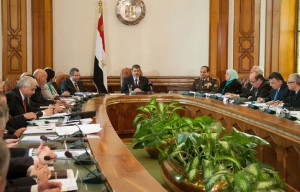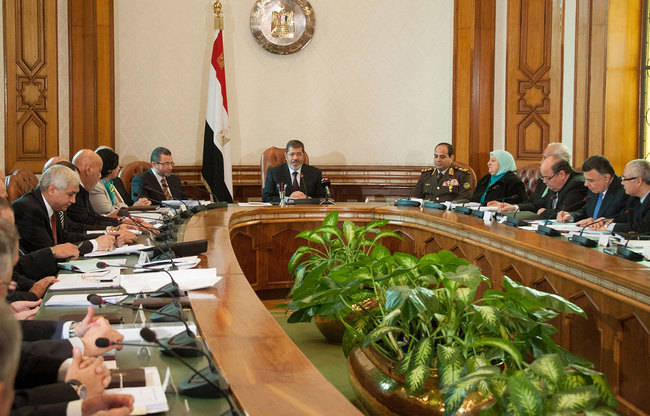
(File Photo) (AFP\Photo)
President Mohamed Morsi’s presidential team has shrunk over the past few months to leave him with five Islamist advisors, three Islamist aides, and only one independent advisor.
Last week, the presidency sacked the Salafist presidential advisor Khaled Alam Al-Din, claiming that he “used his post as presidential aide for personal interest”. Bassem Al-Zarqa, another Salafist presidential advisor, announced his resignation in protest at this dismissal.
Both Alam Al-Din and Al-Zarqa were appointed as presidential advisors in August 2012. They are both members of the Al-Nour Party.
Morsi’s presidential team, which was launched as composing of “different colours of the political spectrum,” is now formed by five Islamist advisors: Ahmed Omran, member of the ultra-conservative Construction and Reform Party, Omaima Al-Salamony, a Muslim Brotherhood member, Hussein Al-Qazaz, a member of the Muslim Brotherhood Guidance Bureau, Ayman Aly, another senior member of the guidance bureau, and Mohy Hamed, a Muslim Brotherhood member. Only Emad Abdullah, a police general, is considered independent.
Since the resignation of Coptic thinker Samir Morcous in late November, Morsi has been left with three Islamist aides: Emad Abdel Ghafour, chairman of the Salafist Al-Watan Party and two pro-Muslim Brotherhood figures, Pakinam Al-Sharqawi and Essam Al-Haddad.
Mohamed Fouad Gadallah, the Vice-Chairman of the State Council and a presidential advisor on legal affairs, is not officially in the advisory board appointed by Morsi. He holds the position of a legal advisor in the palace as Field Marshal Hussein Tantawi and former prime minister Kamal Al-Ganzoury did.
The group was initially composed of 21 members: seven Muslim Brotherhood members, three Salafists, three other Islamist-leaning figures, and eight liberal figures.
Several resignations were announced in the wakr of Morsi ‘s 22 November constitutional declaration, in which he granted himself sweeping powers.
In December, clashes occurred during protests calling on Morsi to cancel the declaration. This has led to several walkouts of independent advisors like veteran journalist Ayman Al-Sayyad, TV anchor Amr Al-Leithy, poet Farouk Goweida, writer Sekina Fouad, political analyst Mohamed Saif Al Dawla and political science professor Saif Abdel Fatah.
Commenting on the decreasing number of presidential advisors in the palace, Al-Sayyad explained that before his resignation, there was never an “actual presidential team with its proper meaning, but there was an advisory board appointed by the president”. He said that the structure of the advisory board began to “shatter after the resignation of a large number of independent advisors”.
As Morsi is currently surrounded by Islamist aides, Al-Sayyad believes it is “logical enough to have Islamist advisors beside him”. He explained that if the remaining advisors belong to the Muslim Brotherhood’s Freedom and Justice Party, they must obey the instructions of their party and support the president.
“That is why we [resigned independent advisors] have been repeatedly calling for establishing a presidential team of only independent members only,” he said, stating that the entire idea behind an advisory board has proven to be a “big failure”.
“They [Islamist advisors] were only present to defend the president when we start to criticise him in meetings,” Al-Sayyad said.
Follow Ethar Shalaby on Twitter @Etharshalaby

